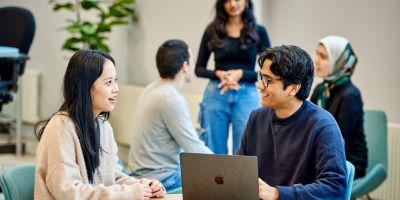School of Law PhD student shines at global law events

Matthew Chippin has recently returned from a tour of international conferences, presenting research on the anti-deprivation rule in insolvency law.
Between April and May, School of Law PhD candidate Matthew Chippin participated in three prestigious conferences in three different countries: the Bob Wessels PhD Workshop at Mykolas Romeris University in Vilnius, Lithuania; the 5th International and Comparative Law Insolvency Symposium at the Royal Holloway University of London; and the INSOL ERA Workshop and INSOL Academics Colloquium in San Diego, USA.
At each conference, Matthew presented various aspects of his PhD project, which specifically examines differing applications of the anti-deprivation rule in England and Canada, using both legal and historical lenses to explore the underlying reasons for these differences. The anti-deprivation rule is a rule of transactions avoidance law that is applied when insolvency statutes have become exhausted. In the insolvency context, anti-avoidance laws prevent individuals from removing assets from an insolvent estate.
One of the main highlights of attending these conferences was the number of experts that gathered at these events. As Matthew explains:
Insolvency is quite a niche field, and it's easy to feel isolated as a researcher. It was incredibly valuable to get feedback from senior academics and to connect with others working on similar projects.
The biggest highlight, however, came at the INSOL ERA Workshop in San Diego, where Matthew was awarded the best presentation prize. This accolade came with a book voucher from Edward Elgar Publishing and the chance to present at the main INSOL Academics Colloquium.
The conferences were more than just an academic exercise; they were also a platform for networking and personal growth. In these events, Matthew had the opportunity to meet several notable figures in the field, including American Professor Jay Westbrook, known for his work on executory contracts, and Canadian Professor Alfonso Nocilla, an expert on the anti-deprivation rule. Both offered invaluable support and resources for the Matthew’s ongoing research.
An unexpected personal highlight was Matthew’s trip to Lithuania, where he had the opportunity to trace his family roots. Guided by local historians Eugenijus Bunka and Edita Gliozeriene, he visited towns linked to his great-grandparents, who emigrated to Canada.

Matthew stands in front of his old family home in Lithuania.
This was one of the most emotional trips I've taken, given my family's history. Most of my great-grandparents' relatives were murdered during the Holocaust. Finding their old family home was very special. Had it not been for the opportunities afforded to me by my research at the University of Leeds, I likely would have never been able to do this.
Matthew also reconnected with former Leeds Professor Zinian Zhang, who expressed keen support for their project. These interactions have paved the way for future collaborations and have already sparked interest in joint research projects.
For other PhD candidates involved in insolvency law, Matthew recommends joining organizations like YANIL and INSOL ERA, to which his supervisors, Professor Gerry McCormack and Dr Oriana Casasola, introduced him. Reflecting on the importance of joining such organisations, Matthew says:
“Once you attend one, you get invites for others, and such subject-specific conferences are the best way to connect with others doing the same thing as you. It is oftentimes difficult to make connections in niche areas of law as so few people are engaged in them. This is why going to these conferences is so important. They are places to exchange research ideas, get feedback, and to meet others with whom you can potentially work in the future.”
Matthew is part of the Centre for Business Law and Practice and the Centre for Criminal Justice Studies at the School of Law. To find out more about their research please click here.




